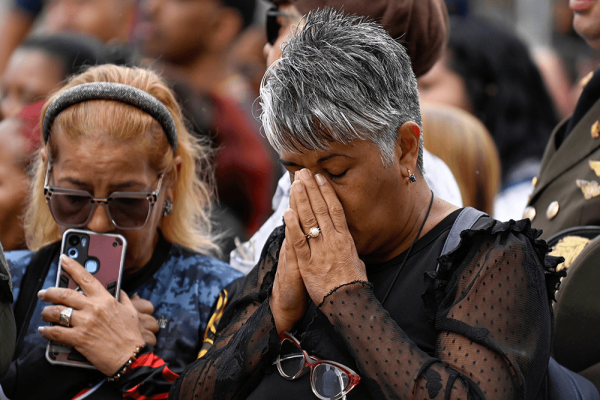The conversation around women in Christian leadership erupted recently, after well-known complementarian pastor and writer John Piper published a piece at Desiring God in which he claimed that because women aren’t fit to preach, they aren’t fit to teach and train men in seminary. After seeing the argument, I put out a call on Twitter to the men of the Christian faith to name the women who have led and theologically shaped them throughout their lives.
I expected a handful of men to respond, but the outpouring of examples of godly women was overwhelming.
At every single crossroad of my life, I've had a woman there walking me through it. Every single time I've hit the depths I've had gracious leaders helping me find clarity. Every time my faith has overwhelmed me a woman has been there to help ease the burden. I would be nothing.
— Devon Bailey (@Devon_Bailey) January 23, 2018
Relevant Magazine and The Christian Post picked up the responses as well, bringing fixed attention on the question not only of whether women can and should lead, but how men respond to their leadership.
The responses ranged from professional to personal, pointing out that even our mothers, sisters, partners, and grandmothers are doing amazing work wherever they are and with whomever they come in contact. The idea often put forward by some men and women in the church that a woman’s place is in the home (without any other option) even undervalues that hard work of educating and shaping our children that so many women are doing on a constant basis without acknowledgement.
A recent Washington Post piece highlights Republican candidate for Senate Courtland Sykes from Missouri who wants “to come home to a home cooked dinner at six every night, one that she fixes and one that I expect one day to have my daughters learn to fix after they become traditional homemakers and family wives.”
This, of course, goes beyond the debate of whether women are able to lead. His view, like many in the conservative church, believes feminism is poison because it insists that women can lead the way men lead, or that there is the ability to choose which path a woman will take, including roles traditionally held by men in America.
“They made [feminism] up to suit their own nasty, snake-filled heads,” Courtland said. “Men and women are different and gender-bending word games by a goofy nest of drugstore academics aren’t going to change anything — except the fantasy life of those confused people in ivory towers.”
This point of view has been perpetuated in the church, in both subtle and blatant ways, and it is a conversation that has been brought up time and again. Now with Piper’s recent comments, the debate centers on whether women are able to teach the way men can in the seminary setting, and even as pastors.
Many of the men who responded to my Tweet shared why the women in their lives poured into them in ways that transformed their theology in a number of ways.
I can’t express how much hearing Rev. Rachel Thompson in the pulpit growing up changed my theology. Having a woman as a pastor (and a @UnionSeminary graduate) meant I didn’t grow up worshiping a patriarchal God.
— Benjamin Perry (@FaithfullyBP) January 23, 2018
Some men claimed that to even begin naming the women who have shown them the way in their faith would be an undertaking:
Twitter doesn’t offer enough characters for their impact.
— Science Mike (@mikemchargue) January 23, 2018
And it matters here that it wasn’t just white women named for their leadership. Many women of color were pointed out as people who have done the important work of helping others deconstruct and reframe their theology into a more godly faith, likeAustin Channing Brown and Wil Gafney, among others.
These are but a handful. If not for women being a part of my life and walk I would not be here today as I am now. The women in my life have been a true blessing and I am so thankful for them.
— Ethan Molnari (@EthanMolnari) January 23, 2018
Fuller Theological Seminary responded to the Tweet as well, posting their position on the issue.
Modern debates over the ordination of women often miss the crucial and basic issues of the holistic concept of the ministry of the Church reflected in the New Testament. Of course, no person should be ordained or given any responsibilities of ministry within the Church because of gender or for the sake of a “point.” On the other hand, we have affirmed in the Church that no person, called and gifted by God, should be denied any role of ministry or leadership in the Church because of one’s gender.
The conversation around women in leadership in churches both gives me great hope and also shows me that we are nowhere near done with this conversation. The reasons offered up as to why women shouldn’t lead are often so ingrained that we don’t notice them, and we end up with generations of women who believe they are not gifted to lead, teach, or pastor others. While some claim that this is simply a matter of biblical interpretation or personal issues of the heart, I believe that our institutions have both a responsibility to state where they stand on the issue and to also understand that if that statement opposes the leadership of women, women will still lead.
What I was reminded of from this string of responses is that women are already leading, and they have been leading for a long time. Regardless of which side of the conversation we fall on, may we be brave enough to have the conversation with grace, and all the while continue to lift up the women who have been doing the heavy lifting all these years in the life and legacy of the church.
Crying with gratitude for this thread. As a young person pursuing vocational ministry, the comments are ever-present, especially bc Im a woman. Just a handful of condemning remarks could derail young people like me from God's calling. Thank you all for reminding everyone of truth
— Carly Bratcher (@carlybratcher4) January 24, 2018
Got something to say about what you're reading? We value your feedback!







